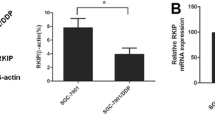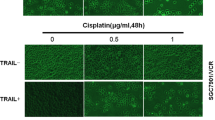Abstract
Background
Programmed cell death 5 (PDCD5) expression is reduced in various human tumor cells, and the protein concentration and nuclear translocation of PDCD5 is also observed during tumor cell apoptosis.
Aims
The purpose of this study was to investigate the differential expression of PDCD5 in six gastric cell lines, and to explore the changes of biological behavior mechanism underlying enhanced apoptosis-inducing effects of cisplatin by PDCD5 over-expression on gastric cancer BGC823 cells.
Methods
RT-PCR and real-time PCR were used to determine PDCD5 expression. BGC823/PDCD5 cells were assessed the cellular proliferating ability by MTT assay, soft agar cloning experiments and tumorigenicity in nude mice experiments in vivo. The effects of cisplatin in combination with PDCD5 on the proliferation and apoptosis were measured by MTT, Annexin-V-FITC/PI dual labeling and cell cycle analysis, respectively. Immunofluorescence was used to detect co-localization of p53 and PDCD5 protein to explore the mechanism underlying the synergistic therapeutic effect of PDCD5 with cisplatin (5 μg/ml for 24 h).
Results
PDCD5 had the highest expression level in the GES1 cell among other cell lines. The growths of BGC823 cells transfected with PDCD5 for six (6th) or 17 (17th) days were both slower than that of BGC823 and BGC823/Neo (P < 0.01). The stable transfection of PDCD5 demonstrated G2/M cell cycle arrest, increased apoptosis and nuclear translocation of PDCD5 and p53 after cisplatin treatment.
Conclusions
Stable transfection of the PDCD5 gene can inhibit the growth of the BGC823 cell line and notably improve apoptosis-inducing effects of cisplatin, indicating a novel strategy for better chemotherapeutic effects on gastric cancer.






Similar content being viewed by others
References
Andrews PA, Howell SB. Cellular pharmacology of cisplatin: perspectives on mechanisms of acquired resistance. Cancer Cells. 1990;2:35–43.
Andrews PA, Jones JA, Varki NM, Howell SB. Rapid emergence of acquired cis-diammine- dichloroplatinum (II) resistance in an in vivo model of human ovarian carcinoma. Cancer Commun. 1990;2:93–100.
Andrews PA, Schiefer MA, Murphy MP, Howell SB. Enhanced potentiation of cisplatin cytotoxicity in human ovarian carcinoma cells by prolonged glutathione depletion. Chem Biol Interact. 1988;65:51–58.
Marverti G, Cusumano M, Ligabue A, et al. Studies on the anti-proliferative effects of novel DNA-intercalating bipyridyl-thiourea-Pt(II) complexes against cisplatin-sensitive and -resistant human ovarian cancer cells. J Inorg Biochem. 2008;102:699–712.
Liu H, Wang Y, Zhang Y, et al. TFAR19, a novel apoptosis-related gene cloned from human leukemia cell line TF-1, could enhance apoptosis of some tumor cells induced by growth factor withdrawal. Biochem Biophys Res Commun. 1999;254:203–210.
Yang YH, Zhao M, Li WM, et al. Expression of programmed cell death 5 gene involves in regulation of apoptosis in gastric tumor cells. Apoptosis. 2006;11:993–1001.
Chen Y, Sun R, Han W, et al. Nuclear translocation of PDCD5 (TFAR19): an early signal for apoptosis? FEBS Lett. 2001;509:191–196.
Spinola M, Meyer P, Kammerer S, et al. Association of the PDCD5 locus with lung cancer risk and prognosis in smokers. J Clin Oncol. 2006;24:1672–1678.
Li SJ, Yu J, Zhao XF, Jiang Y, Liu ZJ, Yu XG. PDCD5 induces the apoptosis of human prostate cancer cells PC-3M-1E8. Zhonghua Nan Ke Xue. 2007;13:979–982.
Du YJ, Xiong L, Lou Y, Tan WL, Zheng SB. Reduced expression of programmed cell death 5 protein in tissue of human prostate cancer. Chin Med Sci J. 2009;24:241–245.
Liu ZH, Zhang D, Li KM, Liao QP. Expression of PDCD5 in tissues of normal cervix, CIN I-III and cervical cancer. Beijing Da Xue Xue Bao. 2004;36:407–410.
Ruan GR, Zhao HS, Chang Y, et al. Adenovirus-mediated PDCD5 gene transfer sensitizes K562 cells to apoptosis induced by idarubicin in vitro and in vivo. Apoptosis. 2008;13:641–648.
Su DM, Zhang Q, Wang X, et al. Two types of human malignant melanoma cell lines revealed by expression patterns of mitochondrial and survival-apoptosis genes: implications for malignant melanoma therapy. Mol Cancer Ther. 2009;8:1–13.
Zhao XY, Liu HW, Wei MJ. Expressions of PDCD5 and p53 in oral leukoplakia and oral squamous cell carcinoma. Beijing Da Xue Xue Bao. 2005;37:429–432.
Ke Y, Ning T, Wang B. Establishment and characterization of a SV40 transformed human fetal gastric epithelial cell line-GES-1. Zhonghua Zhong Liu Za Zhi. 1994;16:7–10.
Kajiwara Y, Panchabhai S, Levin VA. A new preclinical 3-dimensional agarose colony formation assay. Technol Cancer Res Treat. 2008;7:329–334.
Tsai MH, Aki R, Amoh Y, et al. GFP-fluorescence-guided UVC irradiation inhibits melanoma growth and angiogenesis in nude mice. Anticancer Res. 2010;30:3291–3294.
Bergeron S, Lemieux E, Durand V, et al. The serine protease inhibitor serpinE2 is a novel target of ERK signaling involved in human colorectal tumorigenesis. Mol Cancer. 2010;9:271.
Li H, Wang Q, Gao F, et al. Reduced expression of PDCD5 is associated with high-grade astrocytic gliomas. Oncol Rep. 2008;20:573–579.
Chen C, Zhou H, Xu L, et al. Prognostic significance of downregulated expression of programmed cell death 5 in chondrosarcoma. J Surg Oncol. 2010;102:838–843.
Zhang X, Wang X, Song X, et al. Clinical and prognostic significance of lost or decreased PDCD5 expression in human epithelial ovarian carcinomas. Oncol Rep. 2011;25:353–358.
Matsuhashi N, Saio M, Matsuo A, Sugiyama Y, Saji S. Apoptosis induced by 5-fluorouracil, cisplatin and paclitaxel are associated with p53 gene status in gastric cancer cell lines. Int J Oncol. 2005;26:1563–1567.
Chen C, Zhou H, Xu L, et al. Recombinant human PDCD5 sensitizes chondrosarcomas to cisplatin chemotherapy in vitro and in vivo. Apoptosis. 2010;15:805–813.
Shi L, Song Q, Zhang Y, et al. Potent antitumor activities of recombinant human PDCD5 protein in combination with chemotherapy drugs in K562 cells. Biochem Biophys Res Commun. 2010;396:224–230.
Yin A, Jiang Y, Zhang X, Zhao J, Luo H. Transfection of PDCD5 sensitizes colorectal cancer cells to cisplatin-induced apoptosis in vitro and in vivo. Eur J Pharmacol. 2010;649:120–126.
Kim R, Emi M, Tanabe K, Toge T. Preclinical evaluation of antisense bcl-2 as a chemosensitizer for patients with gastric carcinoma. Cancer. 2004;101:2177–2186.
Cho HJ, Baek KE, Park SM, et al. RhoGDI2 confers gastric cancer cells resistance against cisplatin-induced apoptosis by upregulation of Bcl-2 expression. Cancer Lett. 2011;311:48–56.
Ando T, Kawabe T, Ohara H, Ducommun B, Itoh M, Okamoto T. Involvement of the interaction between p21 and proliferating cell nuclear antigen for the maintenance of G2/M arrest after DNA damage. J Biol Chem. 2001;276:42971–42977.
Selvendiran K, Tong L, Vishwanath S, et al. EF24 induces G2/M arrest and apoptosis in cisplatin-resistant human ovarian cancer cells by increasing PTEN expression. J Biol Chem. 2007;282:28609–28618.
Allday MJ, Inman GJ, Crawford DH, Farrell PJ. DNA damage in human B cells can induce apoptosis, proceeding from G1/S when p53 is transactivation competent and G2/M when it is transactivation defective. EMBO J. 1995;14:4994–5005.
Brown R, Clugston C, Burns P, et al. Increased accumulation of p53 protein in cisplatin-resistant ovarian cell lines. Int J Cancer. 1993;55:678–684.
Acknowledgments
We are grateful to Prof. Dalong Ma and Prof. Yingyu Chen for their support of the PDCD5 antibody. We gratefully acknowledge the excellent support from all the members in Prof. Lu’s laboratory. This study was supported by grants from the National Natural Science Foundation of China (39625016), State Key Basic Research Program of China (2004CB518708), the Heilongjiang Education Department Project (Grant No. D2007-108, No. D2007-107) and the Natural Science Foundation of Heilongjiang Province (Grant No. 11531434).
Conflict of interest
These authors have no conflict of interest.
Author information
Authors and Affiliations
Corresponding authors
Rights and permissions
About this article
Cite this article
Xu, HY., Chen, ZW., Pan, YM. et al. Transfection of PDCD5 Effect on the Biological Behavior of Tumor Cells and Sensitized Gastric Cancer Cells to Cisplatin-Induced Apoptosis. Dig Dis Sci 57, 1847–1856 (2012). https://doi.org/10.1007/s10620-012-2090-y
Received:
Accepted:
Published:
Issue Date:
DOI: https://doi.org/10.1007/s10620-012-2090-y




